Just a quick note: we’re on a break for, well, Spring Break. My husband’s a teacher, and so we pretty much live on a high school schedule. Next post will be next week. 🙂
Month: March 2021
Since entering Japan I’ve come across the expected amount of cool gadgets – which is to say, many. But although I was prepared to enjoy robotic sushi trains and dinosaur hotel employees, I didn’t realise there were lots of everyday appliances I never knew I always wanted. In this ongoing series, I’ll explain a few of them.
Hot water dispenser
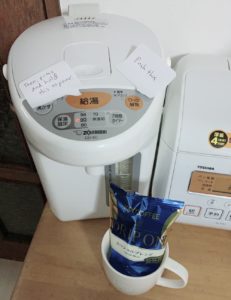
Simple enough to explain – it’s a water reservoir that sits on my counter. I keep it filled with water, and it boils the water and then keeps it at whatever temperature I set. (Usually 90°C) I press a button and hot water comes out. That’s it, that’s the whole gadget.
This has changed my life.
First, I can have tea whenever I want. That may not sound like much, but the difference between “Well, if I want tea in 20 minutes or so, I guess I should put on the kettle” and “I want tea. ::sips tea::” is HUGE.
Second, now that I can have tea whenever I want, I have been free to explore all kinds of lovely hot drinks. Japan has a lot of instant hot drinks, many of which are actually healthy, and the ones that aren’t are still delicious. I’m currently obsessed with a ginger yuzu “tea” powdered drink which is just AMAZING. And for Christmas my husband bought me Persona 5 tea – Crow flavor. (If you know, you know.)
And last, instant ramen (of which you can buy a dizzying array)? ACTUALLY INSTANT. Game changer.
My husband was telling me about some video he had seen where a person talked about how we don’t have enough time to Read All The Books. He said that if he read a book a week, he could only read in his adult lifetime a mere few library shelves. A quick stride down one aisle was all he could manage. Out of a probable 130 million books that have ever been published.
I’m not sure what the point was – something on realizing we can’t know everything? – but it caused a quick panic for me, followed by scoffing.
If you read only a book a week (or more likely, much less than that) as an adult, you’re probably only counting “real” books. As in, you sat down and read something you held in your hand, either on a device or on paper, and you read it front to back. Understood.
If you’re a parent of small children though, this doesn’t count bedtime stories. Or the hundred times you read The Very Hungry Caterpillar this week. But those are books, often very good ones with important things to say, or else you wouldn’t read them to your children even when you’re really too tired, right?
Speaking of which are we counting rereads as “books read this week”? What about the couple of times a day I pick up some random book and read a few pages from the middle because I can’t help it? (I have Reader’s Disease. It’s a thing.)
What about audio books? What level of distraction is allowed to consider those as “read”?
What about non-fiction? Not just the obvious “real books”, but newspapers and magazines, (if you happened to be old fashioned) or their related web articles. How long does a book have to be to count as a book? How many pictures are allowed? What about popups? Reference? What if I skim the really long descriptions? What about scripts?
And what about story in other formats? I read not only comics, manga and graphic novels, but also play visual novels, which are basically games you read and occasionally interact with briefly. Does that count as a book? I think so. If so, what about other games with story as a main point? And if audio books count, shouldn’t video books be a thing? Do movies and TV shows count as books? They certainly count as story.
Saying there isn’t time to read all the books you want is just a scare tactic. We are beings made up entirely of story. We live and breathe it all the time, even while berating ourselves for not reading enough. Read for joy, and maybe let yourself off the hook a bit, hm?
Besides, this means I’ll have roughly 129 million+ books to read in heaven. (Yes, my idea of heaven is essentially a universal Library of Congress.) Excellent.
I hate comparing books.
I feel like I’ve been complaining a lot of here, and I’m sorry about that – really, there are many good things in my life right now, not least of which is that I actually have time to write, which is just amazing and hasn’t been true for many years. I promise I’ll write about some good things on here too.
But first, I really need to repeat this.
I HATE comparing books.
This doesn’t just apply to my own books. My pet peeve is that, for years after Harry Potter got popular, every fantasy book published had a quote on the cover somewhere comparing it to Harry Potter. “The next thing to read after Harry Potter!” “When you’ve grown out of Harry Potter, try this!” Or my least favorite: “Watch out, Harry!”
Several big problems with this in my mind – first, the comparison didn’t do justice to either book. Harry Potter is great, but this other book either 1) has the same feel, but isn’t as well done, 2) has the same kind of ideas, but a very different feel, or 3) has nothing in common except that it’s on the fantasy shelf. And maybe has a young protagonist? In any of these cases you’re either saying that HP isn’t as good as this, or this isn’t as good as HP, or (most likely) they just really hope someone will buy it on pure name recognition and disappoint some grandchild somewhere for their birthday. It isn’t Harry Potter. And that’s totally fine! It’s a different book, and you might even like it better. Or in a different way.
Second, it promotes this dumb competition between books. Which is completely stupid. I don’t know a single person who reads only one book series and books that are compared to it. I know lots of people who read whatever they can get their hands on, especially within a particular genre, but none of those people care if a book has been compared to another book they love, except that it might lead to someone else recommending it to them (and yes I see that’s the point – I’ll get to that). I do sadly know a few people who only read one book or series of books, period. No amount of comparing will get these people to read something else. They just like what they like.
All this is not to say that I don’t understand why this exists – I fully blame Amazon for this – we have this, “Ok, I read this, what’s next?” mindset. It’s a dumb thing to do to ourselves for the reasons I’ve listed above – we’re setting ourselves up for disappointment and not broadening our horizons. We need to stop chasing after that feeling we had when we read that one book, and realize that other books have other feels and experiences to offer us. Different ones. Which is good.
Anyway, this is a long rant to say that a lot of agents require comparables – a list of books that your book is like. I hate trying to do this – I always feel like I’m either reaching too high or not high enough. And I don’t want to sound full of myself and say nothing is like Quirk, but I can’t think of anything like Quirk. Which is why I wrote it in the first place – I wanted to read a book that didn’t exist yet. Comparables might reduce risk in picking a book to represent. But it also might weed out books that are different, and keep the reading public from seeing new things. If we keep churning out more of the same, we’re going to start missing things that could make us grow.
Some days you can explain my life in slippers.
Take days where I wash clothes. First thing in the morning, I head into the freezer of a hallway. (It’s the end of winter – spring is definitely coming, but it isn’t here yet.) I live in an old Japanese house – not old enough to be interesting, just old enough to be inconvenient. It has no insulation. There are single pane windows, and the whole place is made “to breathe”. In the main rooms, we have ductless heaters, but the hallway and bathroom downstairs has none of that. In the winter it freezes and in the summer it burns.
So I wear slippers, and a fuzzy house coat. I make my way to the bathroom/laundry area, and switch to bathroom slippers, which are resistant to slippery wet floors and easy to clean. The washer has just finished running, so I pick up a laundry basket and open up the lid. Some Japanese homes have combination washer/dryers, but they are very slow and mostly disliked. We don’t have that. Most Japanese line dry all their clothes, either outside, in front of the heater, or in the shower if they have a nice shower heater (we don’t). We are actually lucky/Western enough to own a separate, gas dryer. So I start to pull out wet clothes.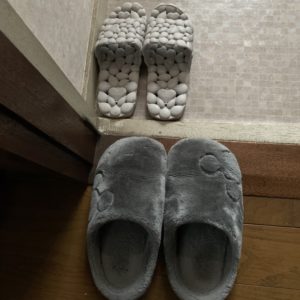
I take out about half, watching carefully for Japanese clothes that won’t stand up to gas dryers. The washer holds up to 9kg, but the dryer is only 5kg, so I usually split a load of wash into two dryer cycles. I hoist the basket, switch into my house slippers and pad to the genkan (a recessed foyer) to switch into outdoor slip-on shoes.
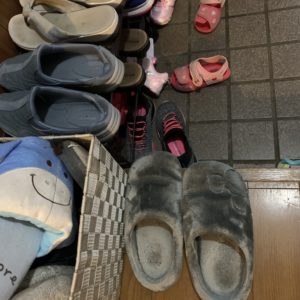
Oh, did I not mention? The only place we could setup our gas dryer with proper hookups and ventilation in our old house…was outside. So we have a working dryer on a stand in our carport area. With a tarp for extra protection from the elements.
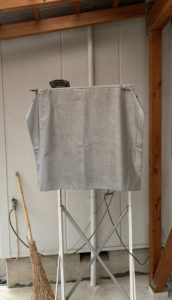
It’s cold, so I put on my coat over the house coat, switch to shoes, unlock the front door and head outside. I head down the stairs and around the corner to the dryer, lift the tarp and pop open the door.
The dryer is filled with clothes. I’d forgotten my husband threw a load in last night and apparently never took them out.
I can’t set the wet (or dry) clean clothes down outside and I don’t have a basket that isn’t full to carry the dry clothes anyway. Sigh.
So I go back inside, switch to house slippers, walk to the laundry, switch to bathroom slippers, dump the wet clothes back in the washer, switch to house slippers, head to the genkan, switch to shoes, go outside and pull all the dry clothes into the basket, come into the genkan, switch to slippers, bring the clean clothes upstairs to put away later, go back down to the laundry with the empty basket, switch to bathroom slippers, pull out the wet clothes again, switch to slippers, go to the genkan, switch to shoes, and finally put the wet clothes in the dryer.
I start the dryer (avoiding the always tempting button with a picture of a man with a big nose and a smile), pull the tarp back over and head back inside. I put the empty basket next to the genkan so I remember that there are clothes in the dryer (I have a system!) and put my coat in the closet and my slippers back on.
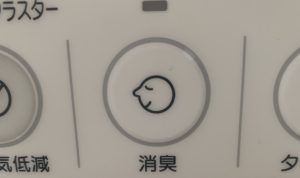
And now it’s lunch time.